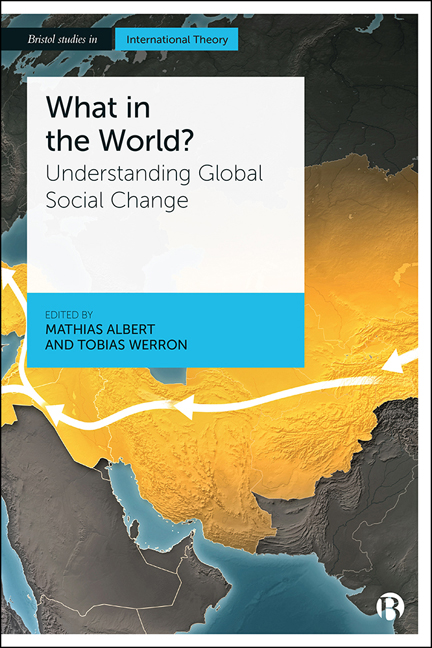Book contents
- Frontmatter
- Contents
- List of Figures and Tables
- Notes on Contributors
- Acknowledgements
- 1 Introduction: World Society and Its Histories – The Sociology and Global History of Global Social Change
- 2 Every Epoch, Time Frame or Date that Is Solid Melts into Air. Does It? The Entanglements of Global History and World Society
- 3 Periodization in Global History: The Productive Power of Comparing
- 4 Communication, Differentiation and the Evolution of World Society
- 5 Field Theory and Global Transformations in the Long Twentieth Century
- 6 Organization(s) of the World
- 7 Particularly Universal Encounters: Ethnographic Explorations into a Laboratory of World Society
- 8 From the First Sino-Roman War (That Never Happened) to Modern International-cum-Imperial Relations: Observing International Politics from an Evolution Theory Perspective
- 9 Nationalism as a Global Institution: A Historical-Sociological View
- 10 States and Markets: A Global Historical Sociology of Capitalist Governance
- 11 The Impact of Communications in Global History
- 12 The ‘Long Twentieth Century’ and the Making of World Trade Law
- 13 Third-Party Actors, Transparency and Global Military Affairs
- 14 Technical Internationalism and Global Social Change: A Critical Look at the Historiography of the United Nations
- References
- Index
2 - Every Epoch, Time Frame or Date that Is Solid Melts into Air. Does It? The Entanglements of Global History and World Society
Published online by Cambridge University Press: 22 December 2021
- Frontmatter
- Contents
- List of Figures and Tables
- Notes on Contributors
- Acknowledgements
- 1 Introduction: World Society and Its Histories – The Sociology and Global History of Global Social Change
- 2 Every Epoch, Time Frame or Date that Is Solid Melts into Air. Does It? The Entanglements of Global History and World Society
- 3 Periodization in Global History: The Productive Power of Comparing
- 4 Communication, Differentiation and the Evolution of World Society
- 5 Field Theory and Global Transformations in the Long Twentieth Century
- 6 Organization(s) of the World
- 7 Particularly Universal Encounters: Ethnographic Explorations into a Laboratory of World Society
- 8 From the First Sino-Roman War (That Never Happened) to Modern International-cum-Imperial Relations: Observing International Politics from an Evolution Theory Perspective
- 9 Nationalism as a Global Institution: A Historical-Sociological View
- 10 States and Markets: A Global Historical Sociology of Capitalist Governance
- 11 The Impact of Communications in Global History
- 12 The ‘Long Twentieth Century’ and the Making of World Trade Law
- 13 Third-Party Actors, Transparency and Global Military Affairs
- 14 Technical Internationalism and Global Social Change: A Critical Look at the Historiography of the United Nations
- References
- Index
Summary
Introduction
The starting point of this chapter is the suspicion that, while global history identifies a range of quite large-scale patterns and even structures, it remains somewhat reluctant to engage with large-scale theoretical accounts (or ‘narratives’) of long-term historical change. World society theory, on the other hand, provides exactly this kind of account, yet, at least in terms of the global unfolding of events, seems to lag behind when it comes to substantiating its claims in historical terms. Global history and world society theory are strong candidates when it comes to effecting an engagement between approaches from history and sociology on the subject in hand. But they are certainly not the only ones out there. Nevertheless, as the chapter will seek to argue, they promise to foster a productive dialogue when both traditions’ strengths are put to good use in reciprocally addressing one another's shortcomings. In that sense, although the chapter provides what is admittedly a parochial reading of both traditions, it does so with the programmatic purpose of stimulating common research agendas.
So, the present chapter attempts a rather bold tour d’horizon that seeks to establish the possibilities for a fruitful exchange between world society theory and global history approaches. It will do so by inspecting the use of ‘turning’ points in their accounts. What is the quality of significant change in both, and can these accounts of significant change be linked to one another? Posing this question means focusing on possible substantive overlaps. It explicitly does not mean asking for commonalities grounded in a common motive from Geschichtsphilosophie (the philosophy of history). Quite the contrary. The argument proceeds on the basis of an acknowledgement that global history and world society theory are probably united in standing quite firm in rejecting any motive from Geschichtsphilosophie (although, as will be argued later, in one respect the latter probably cannot be completely dispensed with when it comes to an epochal view of history). In global history this rejection takes the form of a narrative in which history unfolds as nothing but a transformation of complexity (‘entanglements’); in world society theory it takes the form of a theory of social evolution.
- Type
- Chapter
- Information
- What in the World?Understanding Global Social Change, pp. 25 - 42Publisher: Bristol University PressPrint publication year: 2020



